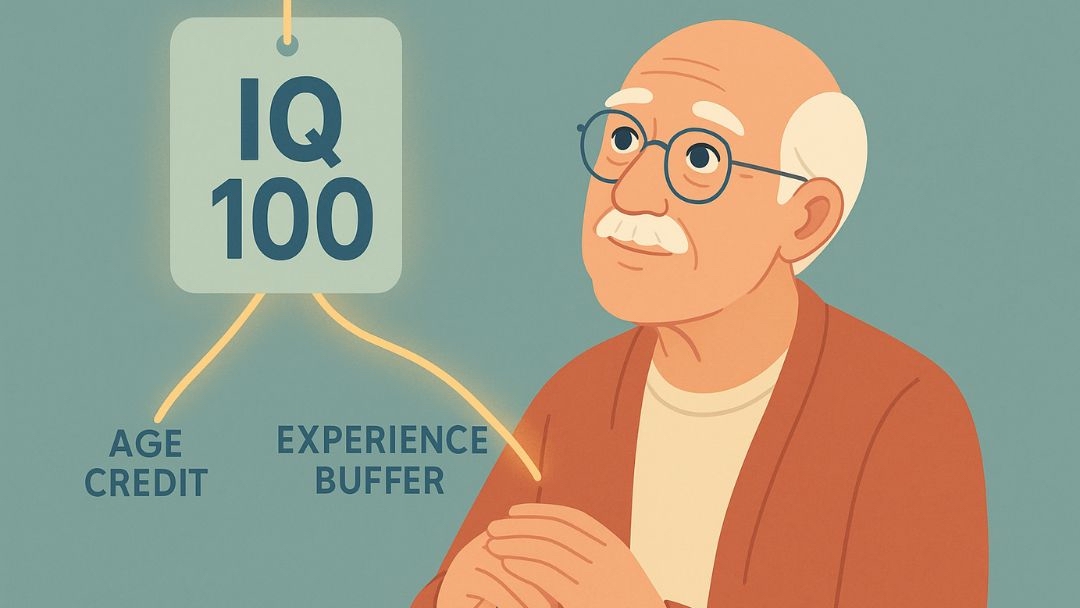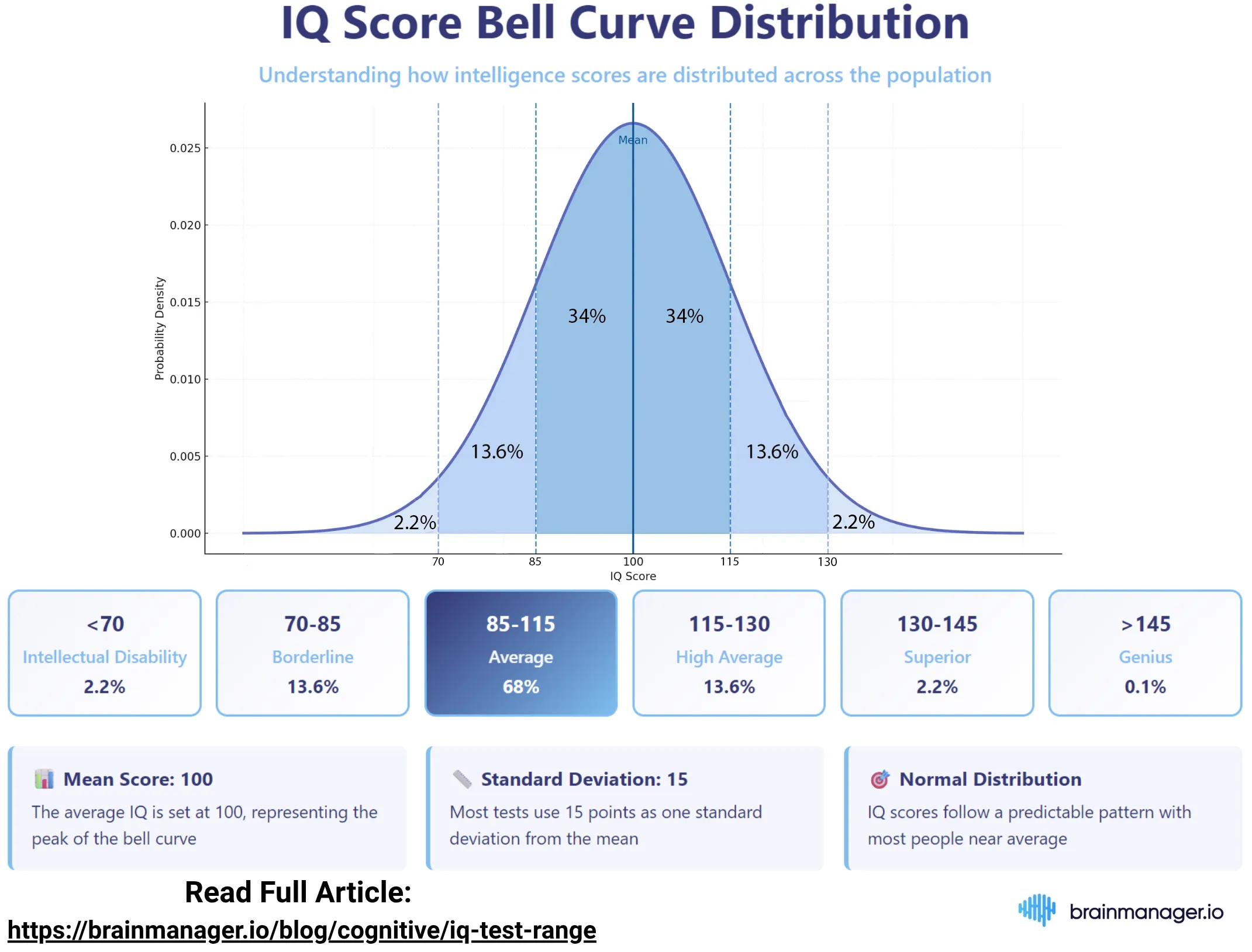Real Average IQ Scores by Age Group: What Tests Don't Tell You
Why does average IQ stay 100 at every age? Because tests are standardized. See what average IQ scores by age really look like without adjustments - complete data table included.


Back
4 mins read
IQ tests are designed so that the average score is always 100. Score 100 and you're considered average, score higher and you're above average, score lower and you're below average. But here's something most people don't realize: this "average of 100" is actually a clever trick that hides what's really happening to our brains as we age.
When psychologists say the average IQ is 100, they mean something very specific. They're not saying that if you tested every person on Earth, the average would be 100.
Instead, they're saying that for each age group, the average is set to 100.
A 20-year-old who scores 100 and an 80-year-old who scores 100 are both considered "average" — but average for their age. The problem is, their actual cognitive performance is nowhere near the same. It's like saying a high school basketball player and an NBA player are both "average" because they're each average within their respective leagues.
What Would "Raw" Average IQ By Age Group Look Like?

This got me wondering: what if we didn't adjust for age? What if we calculated something like a "raw IQ score" that compared everyone to the same standard — say, peak human cognitive performance?
I dug through decades of research from major studies like the Seattle Longitudinal Study, the WAIS-5 intelligence test standardization data, and the Baltimore Longitudinal Study of Aging. These studies tracked the same people for years, measuring their actual cognitive performance as they aged.
How I Calculated Raw IQ Estimates By Age Group
The approach was straightforward. Instead of comparing people to their age peers, I compared everyone to peak cognitive performance (which research consistently shows occurs around ages 18-24). I looked at four main areas:
- Fluid intelligence - your ability to solve new problems and think quickly
- Crystallized intelligence - your accumulated knowledge and vocabulary
- Processing speed - how fast your brain can work
- Overall cognitive performance - a combination of all abilities
Using data from thousands of participants across multiple studies, I estimated what "raw" cognitive performance would look like if we didn't make age adjustments. The methodology drew primarily from:
- WAIS-5 standardization sample: 1,660 participants aged 20-90 tested in 2023-24
- Seattle Longitudinal Study: Over 6,000 adults tracked from 1956-2012
- Baltimore Longitudinal Study: 968 participants with 7-9 year follow-ups
- Victoria Longitudinal Study: 1,023 adults aged 55-94
Average IQ Scores By Age

| Estimated Raw Cognitive Performance by Age (IQ-Equivalent Scale) | ||||
|---|---|---|---|---|
| Age Group | Average IQ Score | Fluid Intelligence | Crystallized Intelligence | Processing Speed |
| 6-8 | 72 | 68 | 75 | 65 |
| 9-11 | 84 | 82 | 85 | 78 |
| 12-14 | 95 | 96 | 93 | 92 |
| 15-17 | 104 | 108 | 98 | 108 |
| 18-24 | 108 | 112 | 103 | 115 |
| 25-34 | 106 | 108 | 105 | 110 |
| 35-44 | 104 | 102 | 108 | 102 |
| 45-54 | 101 | 96 | 110 | 95 |
| 55-64 | 97 | 89 | 109 | 85 |
| 65-74 | 92 | 82 | 105 | 75 |
| 75-84 | 86 | 75 | 98 | 68 |
| 85-90 | 81 | 70 | 92 | 62 |
Several things jump out immediately:
Young adults aren't "average" — they're exceptional. Peak performance happens around ages 18-24, when raw cognitive ability reaches 108. This makes sense when you think about it. The brain has finished developing but hasn't started aging yet.
Processing speed gets hammered by aging. Look at that processing speed column. It drops from 115 at ages 18-24 to just 62 at ages 85-90. That's a 53-point decline — absolutely massive. This matches findings from WAIS-IV research showing raw mean scores predictably decrease across age groups, with processing speed subtests showing some of the steepest declines.
Knowledge keeps growing until middle age. Crystallized intelligence actually peaks around ages 45-54, hitting 110. This represents all the facts, vocabulary, and skills you accumulate over decades of life experience.
The overall decline is substantial. From peak performance at 108 to the oldest group at 81, that's a 27-point drop. In traditional IQ terms, that's the difference between "above average" and "below average."
What This Means in Real Life

These numbers have real implications. When a 75-year-old takes an IQ test and scores 100 ("average"), their actual cognitive performance is probably closer to 86 on this raw scale. The test is essentially giving them extra credit for their age.
This isn't necessarily wrong — it allows meaningful comparisons within age groups. But it does hide the reality of cognitive aging. A 25-year-old and a 75-year-old who both score 100 on a standard IQ test have dramatically different raw cognitive abilities.
The Limitations

I should note that these "raw IQ" estimates are exactly that — estimates. No true "raw IQ score" exists because IQ is always a calculated, age-adjusted measure. Different intelligence tests would yield somewhat different numbers.
Additionally, some of the age differences might reflect generational changes rather than pure aging effects. Today's 80-year-olds grew up in a very different world from today's 20-year-olds.
But the basic pattern holds across multiple studies and different types of cognitive tests. Peak cognitive performance occurs in early adulthood, followed by a gradual decline, with processing speed showing the steepest drops. This has been replicated in studies ranging from Raven's Progressive Matrices to comprehensive cognitive batteries.
The Bottom Line

Age-adjusted IQ scores serve an important purpose — they provide meaningful comparisons within age groups and prevent older adults from feeling cognitively inadequate when compared to peak performers. But they also mask the reality of cognitive aging.
Understanding raw cognitive performance patterns can help us make better decisions about everything from career planning to healthcare. It also highlights the importance of staying mentally and physically active as we age, since lifestyle factors can significantly influence how quickly these declines occur. Whether it's engaging in cognitive challenges or maintaining physical fitness, small efforts can make a meaningful difference in preserving cognitive abilities.
The next time someone mentions their IQ score, you might want to ask: "Age-adjusted or raw?"


Return to Blog





